- Home
- Claire North
Sweet Harmony Page 9
Sweet Harmony Read online
Page 9
This is Harmony Meads, thirty years old, going back to Bracknell.
Her mum meets her at the station, and they get a cab.
The semi-detached she grew up in always stank of Karen, of old woman’s flaking skin, of forgetting to flush the toilet and cheap bright-green washing-up liquid. For a moment, Harmony thinks she can smell it, and wonders if her nose is back, if sense is returning – but it’s just imagination, her brain filling in a gap where feelings should be, plugging her senses with what should be, what could be, anything except the reality of what is.
She doesn’t hear from her London friends. One or two drop her an email occasionally, but mostly they forget. Their lives are busy, bright, hectic, and Bracknell is a long way out of town. Even if you don’t miss the train, there’s half an hour of walking to do on the other end, along pavements strewn with rotting leaves and cracked conkers, fallen from ancient trees pressed against the walls of the old people’s care homes and public swirls of green, a reminder of the great forest that once ruled this dimple in the earth.
Harmony doesn’t leave her room for three days. Karen goes power walking, 8 a.m. on the dot on Wednesdays and Fridays, the chatter and trill of “Oh Carrrooolll! Whoo-hooo!” bursting into the flat from tracksuited women with pale dyed perms like a foghorn in a cloister. Even though Karen has a walking stick, she still goes out with them, using two mountaineering poles to help her keep up the pace, and swinging along merrily at the back with a cry of “Don’t worry about me, ladies!”
On the third day, Karen gets Jenni, the old schoolfriend, to come and visit. Harmony hasn’t seen Jenni for years, hasn’t kept in touch, but Karen doesn’t know much about Harmony’s London life and so reaches out to the only contact she remembers, and who is still in Bracknell.
Jenni studied economics at Warwick University, was going to be an academic, did most of a PhD, but in the end came back to Bracknell to get married, have kids, raise a family. For a while, as she witters on about the nursery and day care and trying to find non-gendered shoes for her baby daughter, so as not to bias her into thinking she has to be a princess, Harmony despises this perky, ordinary woman sat on her mum’s settee. She barely has any upgrades – just a couple to keep her going when the kids leave her knackered, and to help her body make the most of sleep – and slouches with a mug of coffee in her hand and a baby dribbling in her lap, snot and spit and little puckered lips. She is in a single second of revelation everything that Harmony hates about this place, about this humiliation. She snaps, “Well, good to see you. I’m sure you must be going,” and marches into the kitchen to do the washing-up: anything, anything at all to look like she’s busy.
And Jenni doesn’t seem to mind or care and trails along behind her with a merry, “Oh no, we’re not picking Jo-Jo up until two and I went to the shops this morning especially so I could have time to see you, didn’t we, Si-Si? Yes, we did, yes, we did!”
Karen has deliberately “gone to the post office” that morning, though what could be that urgent or take that long, Harmony cannot imagine. When she comes home, plastic bag full of pasta, cheese, mince and tinned tomatoes, she very politely doesn’t ask how seeing Jenni was, or how Harmony is doing, but simply exclaims, “Lasagne tonight! I know you like the crispy bits!”
That’s the night that Harmony checks her phone and sees that K-blast and Zenblood have both reached the end of their contract.
Do you want to renew?
Chapter 29
One day, Harmony started going for walks by herself.
Nothing provoked this. There was no bolt of lightning from the sky.
She walked because where before she had not wanted to, now she did.
Got out of that room because it was time.
She lived on benefits, which didn’t pay her way, and her debt did not decrease, even though the credit card companies gobbled up her meagre income before she could even buy food with it, and she didn’t pay rent, and slowly her body learned to adjust to life without upgrades.
The hair loss slowed, and her mum got her mate Christina round to do her hair, and when she first suggested it Harmony snarled, “That bitch isn’t touching my head!”
And then she thought about it, and realised that she hadn’t had a haircut for years, and remembered Christina as quiet and gentle, and not to be blamed for her mother’s oppressive, offensive, irredeemable kindness, crushing Harmony like a ton of feathers.
So she said, “Actually. Yeah. I think Christina could be . . . Yeah.”
Christina was in her early seventies, but still had the moves with the scissors. She set Harmony up in the kitchen, washed her hair with something that she couldn’t smell and set to on the muddy, drained lengths.
She went short, a pixie-cut that made her ears stick out. Her neck felt unnatural, exposed, light, a huge weight of shorn locks, a foot or more of it, tumbling to the ground like spiderweb spinning in the breeze.
“It’s good for the hair to be given a chance to grow,” mused Christina, running her fingers through the tufty, shorn-down top of her scalp. “It’s good sometimes to start again.”
Karen watched and said nothing, and Harmony remembered then that she probably did love her mother after all, and had never been given any reason to be anything other than grateful.
Her skin settled a little. She still had pores, great gaping pores, bubbles of black and hollows of pink all across her face but this was, her mother calmly informed her, normal. Just what normal was.
Her weight gain stabilised. When she bent over, the fat in her belly buckled like the crushed hull of the Titanic; her thighs and backside spread wide across the rough striped seat of the bus to the shops. The suitcase of clothes she’d worn when she was beautiful, of straps and strings, of exposed flesh and curving seams, remained unopened under the childhood bed. She bought clothes from the discount store at the shopping centre, next to the stationery shop where once she’d worked.
It took her a long time to muster the courage to go back inside that shop.
Nothing had changed.
The same pens.
The same shelves.
The same layout, with gift bags on a spinning rack by the door, artists’ supplies at the back by the coloured paper, printer cartridges on hooks behind the counter. A new generation of children worked at the till, and they were beautiful.
Youth was beautiful.
Hope was beautiful.
Even here, selling ballpoint pens and manila envelopes, in their baggy T-shirts and terrible hair, with the world faded to shades of sepia punctuated by spikes of brilliant blue, Harmony looked at her fellow humans and, for the first time in a very long while, thought that they were magnificent.
Then a voice called, “My God! Harmony?!”
And there was Karima, sixty-eight years old, still not retired, the matron of the stationery shop, rushing towards her former worker to give her a gigantic, soppy hug.
Chapter 30
This is Harmony Meads, thirty-one years old.
For a while, she thought she was a victim.
For a while, she blamed herself.
She works at the stationery shop in the centre in Bracknell, walking to work every day past the discount gold shop, the shop that sells icons of holy Jesus, the big hotel that dominates the sky and hosts conferences on pipes, window handles and the latest development in escalator refurbishment technology. She is a few stone overweight, but she no longer considers her body disgusting. Not as much as she used to, at least. She can rationalise these things now. She knows that it’s just a psychology, a social sort of thing.
When Karima retired, a boy called Tim got the supervisor job. Tim is nineteen years old and has as many upgrades as he can pay for. He can prove, with charts, that every physical upgrade he gets also boosts his IQ, and has very strong feelings about portable phone rechargers. Harmony suspects he will go far.
Harmony lives at home, and slowly pays down her debt.
At her current rate, without paying ren
t, she should have paid it all off by 2048, at a cost of only £117,512.
She has decided that blame is not a productive state of mind. What good is it if it is without justice?
On Sunday mornings, Karen Meads goes to church.
She’s not sure if she believes, but all her friends go to church and it seems like a nice thing to do. She wants to go to the old church, the one with the spire and the bits of stained-glass window – not all stained glass, because that’s expensive, but bits here and there. There are always nice flowers at the old church too, and the singing is all right. But if she’s honest with herself, she finds the priest a bit too “fire and retribution” and she’s not sure she needs that on a lovely Sunday morning, so she goes to the other church, in a single-storey building with a slanting grey roof and a crucifix in plywood outside the door. The music is more modern, but also more upbeat, and they have interesting food at the social nights.
“You should come!” she exclaimed one morning.
“Mum, you know I don’t believe in that crap.”
“Always good to get a bit of humility in your life; good to connect with a higher power!”
This doesn’t have to mean Jesus. If Karen was born in Israel or Indonesia, Thailand or Japan, she would be as happy connecting with Buddha or an ancestral spirit as with any Christian deity; the point is the turning up, not details.
Harmony finds these things frustrating, hypocritical and trite.
If she had to sum her mother up in three words, it would probably be those.
And yet she sleeps in her childhood bed and eats her mother’s pasta and knows that without this, she would be damned.
Sometimes she wishes her mum would ask for rent.
Sometimes she wishes her mum would call her a loser. Then she could be hurt, and cry, and know that her mum didn’t understand and didn’t love her, and then Karen would be mortified, struck down with guilt and they could call each other names and say how fucking stupid they both were and that would be better. That would be, perhaps, a different kind of easy from this polite, unquestioning support; this generosity without complaint that was slowly, inexorably, driving Harmony mad.
She picked her mum up after church on Sunday. That was the compromise they agreed on. Sometimes she wondered if her mum wanted to come so she could show her off, if Karen was proud of her, wanted everyone else to see her wonderful, beautiful daughter.
But then she looked at herself in the mirror, thirty-one, fat, ugly, living at home and working in a stationery shop, and could not conceive of any force so powerful that it could possibly love or be proud of her.
Sometimes they just went home. Sometimes – most of the time – they went to the shops to pick up a little something for supper. Sometimes – rarely – they went to the pub with a couple of the old farts from the church, and Bill who ran the scouts, and Morris who was big into amateur dramatics, and was going to be in a show at the local theatre for a couple of nights playing a butler.
“Is it a big part?” Karen asked, and he would humbly reply, “We’re an ensemble company,” which everyone thought sounded very impressive, and Harmony suspected meant he didn’t have any lines.
This weekend, they walked together round the duck pond just to the south of the church, where the old men sat with young boys fishing between the trees, and the grass was mown to a perfect sheet behind a sign that read “PRIVATE LAND – NO TRESPASSING!” before erupting upwards in a sea of stalks and spiny yellow limbs along a perfect line decided by she knew not what gardener a long time ago.
A heron watched the world suspiciously from the edge of the muddy water. A pair of ducks snapped irritably at each other, before one lost patience and scampered for the sky. On the far edge of the green, a row of little houses ran in perfect ticker-tape order, matching windows and matching doors, matching gardens and matching walls.
They sat on a bench and watched a dog walker, five dogs tangling in leads around his feet, four coming to perfect obedience when he barked, “Sit!” and one confused, still spinning, yapping, not understanding why the fun must stop.
Karen thumbed her wedding ring, her flesh long since grown too spongy for it to spin round her finger, the action of pressing against the diamond an unconscious, ancient thing. Harmony waited, the feeling of despair already settling over her soul, for if this anxiety meant one thing it was that Karen wanted to Talk Seriously.
At last, a sudden blurt: “I always thought that I should have done better with my life.”
Harmony hesitated, the dry retorts that she had prepped withering. These were not words she had expected from her mother.
“I mean, it’s a difficult one, isn’t it? Not everyone can be a superstar, or an astronaut or anything like that, I mean, that’s not realistic, that’s not how life works. There is a lot of dignity, a lot of honour, isn’t there, in coming to terms with your reality? In learning to accept where you are being at peace with it, at peace with yourself, I mean? When your father died, I thought . . . But it’s about what matters to you now. How you comport yourself. I have always tried to be a good mother, and a good friend. I mean, kind to my friends, always thoughtful, that’s very important isn’t it? And a lot of famous people I don’t think are kind, and that’s a pity. I mean, there’s no point having money or looks if you’re . . . ”
She stopped dead. Stared at nothing. Fumbled at the ring.
Harmony’s face burned, and she was grateful for the cold, autumn wind.
Then: “And of course, sometimes I just think . . . what a fucking stupid fucking mess we’re in. And I’m really angry, and I hate myself for not doing better, for me, but also for you, for not giving you something better, and think we should just go and burn something down, but I can’t work out what.”
Now Harmony gaped, turning to stare astonished at her mum, body and eyes all angled in the direction of the older, slouching woman. Karen smiled, gave a little, half-hearted shrug. “It’s just a feeling, isn’t it? You mustn’t let these things get to you. You just have to cope.”
“What?”
“Well, with all the things that happen – and I know this isn’t the life you wanted – but with all the things that happen I do genuinely think, I mean, after a long time thinking about it – but I genuinely believe that you just have to accept the lot you’ve got, and deal with it. Muscle through. You’re such a strong person. As long as you’re still a good person on the inside.”
This is Harmony Meads, listening to life wisdom.
Listening to her mother’s placid, flaccid, useless, stupid fucking life wisdom.
And here they come, all the words, the cascade of stupid sounds that Karen has been saving up for so long, they’re finally out and maybe it’s God, maybe she heard something in church that made her think this might be a good idea, because here are all the phrases that Harmony has been waiting for from the second, from the very moment she came home.
“ . . . and if you believe in yourself, and value yourself, then maybe it doesn’t matter if other people think you’re beautiful, and I always think the most beautiful people are just the ones who are confident, who really know themselves . . . ”
Here is the judgement, the judgement she’s been waiting for, the great gush of homely fortune-cookie wisdom that doesn’t mean shit in the real world, that hasn’t ever left fucking Bracknell, that thinks a trip to Kingston is the height of adventure.
“ . . . if you think about it, you’re actually very lucky. You’ve got brains, you’ve got a lot of really good experience, you could try for jobs, pick yourself up, and of course you’re always welcome here – I really love having you around – really love you! – but you could make so much of yourself without this . . . this fashion nonsense getting in the way, without . . . ”
Harmony Meads, being fucked by Jarek, do you have upgrades, do you have Elevation, when you get fucked people are like that was the greatest thing ever, babe, baby, give me your phone, you’re the most beautiful fucking thing I’ve ever . .
.
“I mean, can’t you just be happy about who you are?”
Harmony was on her feet.
Karen whimpering behind her, all the little hollow sounds: “Oh darling, dearest, I didn’t mean to make you . . . I just thought it was worth saying the . . . And you’re so precious to me I love you so much it’s . . . ”
She picked a random direction and walked away, tears brimming around the rims of her stupid, ugly, beady eyes with their saggy lids and bruised, tired grey-brown smears, although who knows what colour they really are she hasn’t seen colour for so fucking long the money and the debt it just keeps on climbing; there’s nothing she can ever do that will ever change any of this fucking shit, not while she’s in Bracknell, not while she’s ugly and fat and . . .
Karen tries to scramble after her.
Can’t move as fast with only one stick: she’s not done her power walking warm-ups.
Breathless, calling her name, but not too loud, because there are the fishermen around and she doesn’t want to cause a scene.
If Harmony looked back, she might see her mother cry.
But probably not. Crying didn’t help anyone.
Harmony walked.
She didn’t care where, or if she went in circles, or when it started to rain, or that her legs ached or that people were staring at her. She didn’t even recognise the pub in Martin’s Heron when she found it, but it was a pub, and it probably stank of beer and old men with nowhere else to go and kids who’d just waste their lives pulling pints for £5.40 an hour and toilets with sticky paper on the floor and graffiti on the wall written by idiots who thought they were in love, and it was perfect.
It was perfect.
She ordered Coke and vodka, and then just vodka, and it was great.
Her phone beeped in her pocket.
You appear to be above your recommended alcohol limit. Would you like to browse our range . . . ?

 Gamehouse 01 - The Serpent
Gamehouse 01 - The Serpent The Master
The Master Gamehouse 03 - The Master
Gamehouse 03 - The Master The Thief
The Thief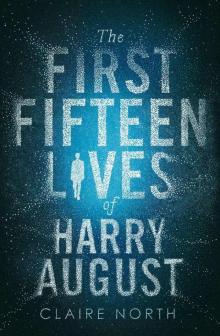 The First Fifteen Lives of Harry August
The First Fifteen Lives of Harry August The Serpent
The Serpent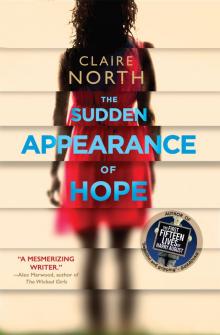 The Sudden Appearance of Hope
The Sudden Appearance of Hope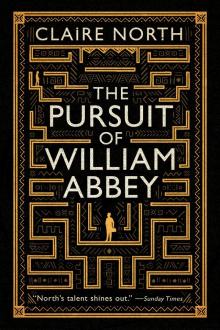 The Pursuit of William Abbey
The Pursuit of William Abbey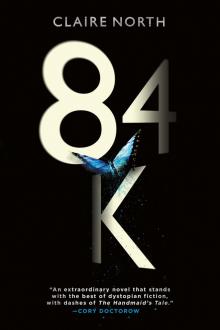 84k
84k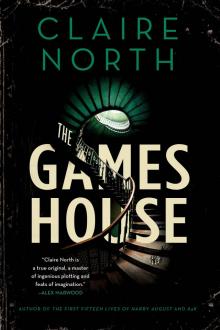 The Gameshouse
The Gameshouse Touch
Touch Sweet Harmony
Sweet Harmony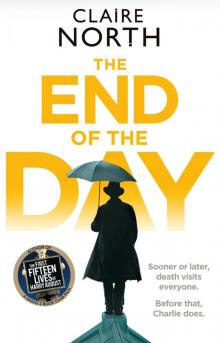 The End of the Day
The End of the Day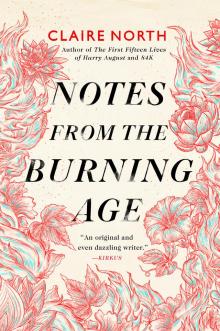 Notes from the Burning Age
Notes from the Burning Age